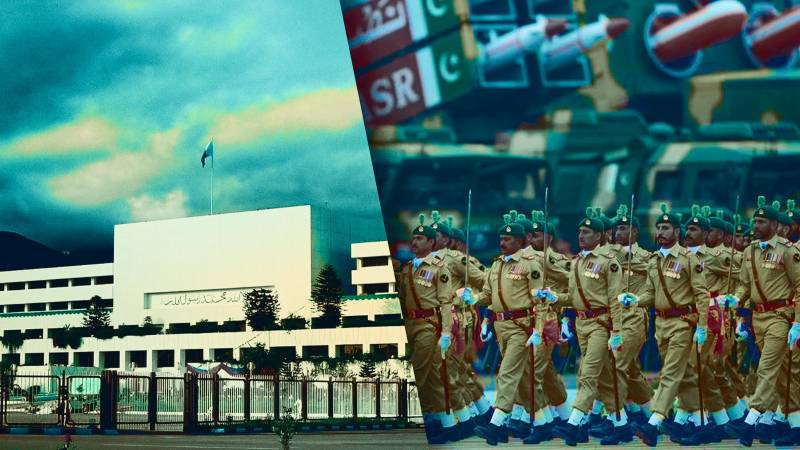
Democracy with power vested in the people was an early casualty in Pakistan’s troubled political history. Power centralization, martial laws, abrogated constitutions, tainted elections, and ruthless force to maintain order have impeded political progress for over 75 years.
The hallmarks of a vibrant democracy — political freedom, accountability, and the rule of law — were replaced by illegality, violence, and arbitrariness associated with autocracies. It made the country more vulnerable to authoritarianism, populism, and polarization.
Political ideals like collective decision-making and equal justice did not take hold. The reinforcement of democratic values remained shallow and compromised. Ultimately, without a democratic and pluralistic culture, the authoritarian mindset became entrenched.
Today, the autocratic order nervously prevails. The power elite prevents a genuine representative government through the ballot box. A managed democracy with boots looking over the shoulders of politicians has become the established form of governance. It promises stability and gives the appearance of a representative government.
But hybrid governments that mix authoritarian and democratic values are not genuinely democratic. They have some democratic features, such as regular elections, but lack vital elements like diversity and pluralism, checks and balances, the rule of law, a free press, and robust protection for human rights and freedom.
For the narrow elite, all is better under an autocrat. The powerful have sold the idea that a corrupt democracy can make more fatal mistakes than a strong autocrat or hybrid regime. It is despite much evidence to the contrary, such as the debacles in Bangladesh and Kargil. In both instances, the establishment acted arbitrarily, undemocratically, and autocratically.
The establishment has taken on the role of grooming and propping up pliant political leaders. However, establishment tutoring and benevolence have produced autocrats unschooled in genuine democracy and more inclined to use power for personal gain. Such leaders lack loyalty to democracy in their parties or the country.
They encourage fascist tendencies, intimidation, and violence to achieve political ends. The lack of democratically minded leaders has led to political revenge and confrontation. Needless intransigence and personal egos have contributed to frequent chaos and instability. It makes a peaceful and orderly power transfer increasingly challenging.
Despite the suppression of genuine democracy, its desire among the people has not died. Pakistan has strong political parties, a rarity in the Muslim world. The population has often resisted authoritarian rule, undeterred by the risk of retaliation. Pakistanis are not inherently against political liberalization and democratization.
Moreover, the establishment misuses state power to make or break political leaders with impunity. Any leader stepping out of line faces removal or worse. Powerful vested interests control the pillars of government, media, and the economy, making the system unfair.
Still, the hybrid model has failed to meet the needs of society in Pakistan. Economic decline, poverty, illiteracy, corruption, terrorism, elite capture, and gender inequality are damning evidence. The ever-widening wealth gap between the rich and poor is a ticking time bomb.
Artificially induced stability has not prevented the rise of politically marginalized and terrorist groups. It shows that a controlled democracy cannot manage instability and conflict. It is convenient for the establishment to blame politicians and democracy for the myriad of problems that the country faces. But it is the failure of genuine democracy to take root that has prevented its dividends from reaching the people.
Democracy is a demanding form of government because it balances individual freedom and general order. However, representative democracies have proven to be more stable than hybrid regimes.
Arguably, democracies enjoy better economic growth, equality, and educational achievement. Importantly, democracies allow the people to hold leaders accountable and complain about poor conditions. It is better than suffering in silence under autocratic rule.
Despite the suppression of genuine democracy, its desire among the people has not died. Pakistan has strong political parties, a rarity in the Muslim world. The population has often resisted authoritarian rule, undeterred by the risk of retaliation. Pakistanis are not inherently against political liberalization and democratization.
Unlike East and West Asia, autocracy has failed to establish firm roots. The Chinese and Egyptian autocratic governance models are unlikely to work in Pakistan for an extended period.
Pakistan needs representative democracy for survival and progress, not authoritarianism or institutional interference. State repression is a slippery slope that can lead to everyone living in fear and crisis. The establishment must realize that capitalizing on political instability to secure its position has run its course.
It is time to restore popular sovereignty, constitutionalism, and the people’s ability to choose their leaders. The establishment must take the lead in a non-violent democratic transformation or else face constant turmoil. The political system has to focus on the people, not just elite needs: health, education, and welfare.
The give-and-take of democracy is the only mechanism to develop a broad consensus on how to run the country and solve its problems. It will need collective decision-making and an unending cycle of free, fair, and transparent elections. One can only hope that the powers that be are listening.

